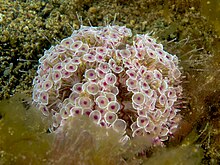Toxopneustes is a genus of sea urchins from the tropical Indo-Pacific. It contains four species. They are known to possess medically significant venom to humans on their pedicellariae (tiny claw-like structures). They are sometimes collectively known as flower urchins, after the most widespread and most commonly encountered species in the genus, the flower urchin (Toxopneustes pileolus).
| Toxopneustes Temporal range:
| |
|---|---|

| |
| The flower urchin (Toxopneustes pileolus) is potentially dangerous to humans | |
| Scientific classification | |
| Domain: | Eukaryota |
| Kingdom: | Animalia |
| Phylum: | Echinodermata |
| Class: | Echinoidea |
| Order: | Camarodonta |
| Family: | Toxopneustidae |
| Genus: | Toxopneustes L. Agassiz, 1841 |
| Type species | |
| Echinus pileolus Lamarck, 1816
| |
| Synonyms[1] | |
| |
Species
editSpecies included in the genus are the following:[1][2][3][4]
| Image | Scientific name | Description | Distribution |
|---|---|---|---|
| Toxopneustes elegans Döderlein, 1885 | Can be distinguished by the presence of a distinctive dark stripe just below the tips of their spines. | Restricted to waters around Japan. | |
| Toxopneustes maculatus (Lamarck, 1816) | Can be distinguished by bright violet coloration on the bottom and in a band around the middle of their tests. | Very rare species found in the Indo-West Pacific. Known only from specimens from Réunion, Christmas Island, and the Palmyra Atoll. | |
| Toxopneustes pileolus (Lamarck, 1816) | Can be distinguished by variegated red, grey, green, or purple coloration of their tests. | Common and widespread in the Indo-West Pacific, from East Africa to the Cook Islands. | |
| Toxopneustes roseus (A. Agassiz, 1863) | Can be distinguished by the uniform coloration of their tests of pink, brown, or purple. | Restricted to the East Pacific, along the coasts of California, Mexico, Central America, and part of South America (including the Galapagos Islands). |
Gallery
editReferences
edit- ^ a b Andreas Kroh (2014). Kroh A, Mooi R (eds.). "Toxopneustes pileolus (Lamarck, 1816)". World Echinoidea Database. World Register of Marine Species. Retrieved November 22, 2014.
- ^ Wolfgang Bücherl & Eleanor E. Buckley (2013). Venomous Animals and Their Venoms: Venomous Invertebrates. Elsevier. pp. 427, 431. ISBN 9781483262895.
- ^ Alexander Agassiz & Hubert Lyman Clark (1912). "Hawaiian and Other Pacific Echini: The Pedinidae, Phymosomatidae, Stomopneustidae, Echinidae, Temnopleuridae, Strongylocentrotidae, and Echinometridae". Memoirs of the Museum of Comparative Zoölogy at Harvard College. 34 (4): 207–383.
- ^ Hubert Lyman Clark (1925). A Catalogue of the Recent Sea-Urchins (Echinoidea) in the Collection of the British Museum (Natural History). Oxford University Press. pp. 122–123.